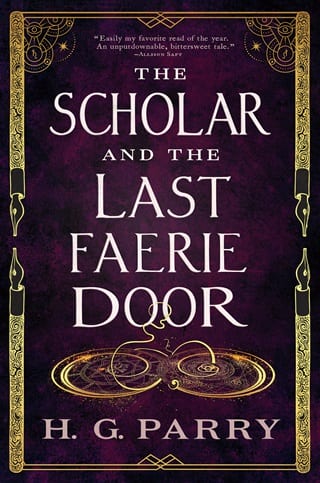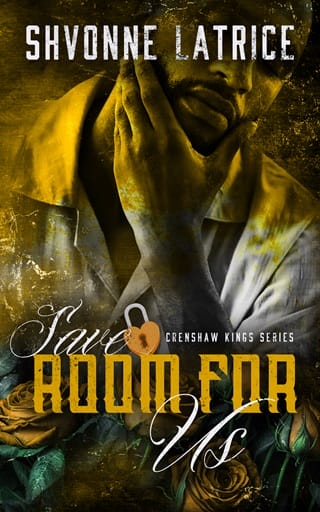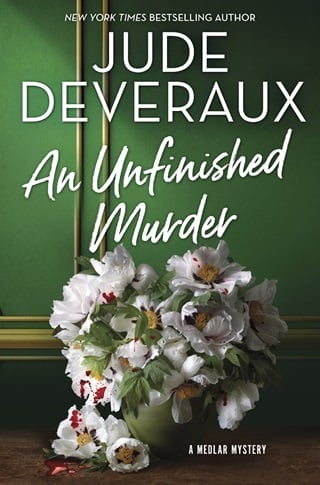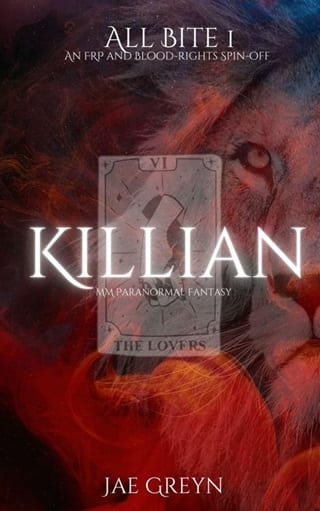5
5
I t was perhaps a week or so after that afternoon on the roof when I slipped into a third-year history lecture. The lecture was taught by Dr. James Larkin, a scholar I had never met, and it was titled "Amiens and the Accord: The Last Days of the War."
In the midst of all the essays and group projects and getting to meals on time, I was still trying to the best of my abilities to learn about faerie curses. Everett Dalrymple had been perfectly right about their exclusion from the curriculum and the tight-lipped secrecy surrounding fae magic in general from the lecturers. I was learning, however, that it wasn't quite so simple to make an entire branch of spellcraft disappear. In Folklore, the fae featured heavily in stories and superstitions, and because none of the information was practical, Professor Bolton saw no difficulty with imparting it. Linguistics of Spellcraft was less helpful, though I did at least learn from Professor March's introductory lecture that faerie language was incredibly powerful and no human had yet mastered it. Professor Smallington-Reeve in History of Modern Magic studiously avoided any mention of faerie encounters. It was easy to do—history was vast and nebulous, and this was a first-year survey course that swept past decades in a single hour. A simple thing, to sweep other things out of sight at the same time.
Botany, where I had expected nothing fae-related at all, actually yielded the most disquieting information, and that was thanks to Eddie. It was a morning of lashing rain after one of the lectures, as we sheltered under the eaves of the library with our hands wrapped around our mugs of tea for warmth. I can't remember what we were discussing, only that it involved the plausibility of using tree bark to heal minor curses.
"The curse that struck my brother looks like the bark of a tree," I said, almost without thinking. They all knew about Matthew now, but I didn't speak of him often.
Eddie only nodded seriously. "What kind of tree?" He must have seen the surprise on my face, because he hastened to explain. "It makes a difference. My grandfather used to study the fae. There are different kinds. The ones you bargain with, those are usually sprites or elves, the mischief-makers. Others, though, are born from trees—dryads, you know. They're the ones whose curses manifest as tree bark. They send out tendrils of their own magic, and the tendrils burrow down until they reach the heart and take root."
My own heart quickened with excitement.
"It's a silvery bark." I racked my memory. I had seen the wound only a few times, when Matthew first came home. Once he no longer needed help, he kept it hidden from us along with everyone else. "A birch, perhaps, or something like it."
Eddie nodded again, as if that made sense. "The theory is that's why survivors of curses like that try to get to faerie country when the veils are thin. The magic inside them is trying to return to its tree. It's a dangerous curse."
"Because it drives them to faerie country, you mean?"
"That too. But I meant because it's alive. It's difficult to heal properly—my grandfather always said the only sure way was to bargain with another faerie, and that's not even possible anymore. And while it lives, it keeps growing. You might find it takes more and more of him as it does."
Unbidden, the image of those green-laced eyes, the smile that turned my brother's face into something else, rose to the surface of my brain.
"Sam never warned us about anything like that," I said, too briskly. I refused to shiver. "He said he'd stopped it."
"He probably did." Eddie had evidently picked up my mood. "Nobody's had much of a chance to study faerie curses over time, and certainly not me."
I found a smile for him. "I'm sorry. I didn't mean to bite your head off. I just hope you're wrong."
It worried me, though. I knew even then that Eddie was rarely wrong about plants.
The truth, and the reason it had been on my mind in the first place, was that Samhain was fast approaching. It was more of a curiosity than a time of serious ritual in the world of modern magic, though there were several loud and competing parties in the week leading up to it and more than one student claiming to have seen a ghost in the clock tower. At home, though, it would be the first midnight since I had left—the first time Mum and the others would be handling things without me. The worry I had managed to quiet my first few weeks at Camford, so sickeningly familiar from Matthew's long years at the front, started to gnaw again.
"Why don't you go back to help?" Hero suggested, when I confessed to her what was bothering me. "You would only need to miss a few days of lectures. You can share my notes—though you'll have to rely on Eddie for Botany. I'm very fond of you, darling, but I don't rise before nine for anybody."
I found a smile. I should go home, I knew. I had promised them I would before I left—had insisted, even when Matthew told me not to be stupid. But I hadn't understood, when I had made those promises. I hadn't counted on how many assignments I would have, how hard I would be working to keep up, how desperately I needed to fight to succeed. Besides, I had thought that by the time I came home, I would have new magic to help. The truth was, I had made almost no progress in breaking the curse. I couldn't go back and tell my family that. They would be so disappointed. They might question whether there was any point in my being at Camford, when there was nowhere in the world I wanted to be more.
So I was more relieved than I wanted to admit when I saw the lecture about Amiens on the third-year timetable—and saw, crucially, that it was slated for the first of November. A lecture about the battle where Matthew had been cursed, the day a faerie had broken free and caused faerie magic to be banned forever. That, of all things, couldn't be missed, and there was no possible way I could be at home for the night of Samhain and make it back to Camford in time. I sent a telegram home at once, informing them that something important had come up and I couldn't be there, telling them (at added expense) how sorry I was and how I hoped everything would be well. I tried not to notice how relieved I was—how my brain shied violently from the thought of one of those long, frightening midnights, and ran toward the safe glow of books and study and magic.
Third-year history papers were usually taught in the Rookery, a large and particularly overgrown stone hall at the south end of the university. It earned its name for its exceptionally high ceilings, in the rafters of which nested a flock of semi-wild ravens. They were a relic of the days when the magical world had used them to send messages—some of the older generation still used them, I had heard, though most now preferred the telephone or the regular post—and nobody had been able to shift them in over a hundred years. Their swooping and rustling high overhead added to the general draughtiness of the building, and that alongside the possibility of an unwelcome surprise splatting onto your papers or head meant that it was usually reserved for less popular theoretical courses. This time, though, the theatre was full as I slipped in, trying not to be seen.
I had been to lectures for which I wasn't registered before, trying to fill in the many gaps in my knowledge, and there was no rule against it. Still, it always felt strange, clandestine, like an act of theft. It didn't help that being one of the few women in the university made it difficult to hide. I snuck into the back row, windblown and surreptitious, and still earned a curious look from a gangly student doing a crossword under the table.
"Amiens wasn't the first breach of the war," the lecturer was saying, down at the front of the room. "There had been many, on both sides."
I had never seen Dr. James Larkin before. He was a sandy-haired, thick-set man, perhaps forty or so, and he held the sides of the lectern in an iron grip that belied his surprisingly light, pleasant voice. I kept my eyes and ears on him as I opened my satchel.
"Scared soldiers throwing fire and ice at their enemies," he said, as though working through a list. "Protective spells thrown in front of bullets at the last moment, water purified and food made good in the rot of the trenches. For the most part they were harmless, difficult to detect or prove afterwards. Sadly, most of them weren't even effective. A bullet is a counter to a good many spells—besides, as I'm sure your practical exams have taught you, magic is easy to fumble under stress. All it takes is a hand too stiff with cold to perform the correct movements, a voice too hoarse with thirst to pitch the words correctly, a mind too blurred by fear to find the right combination, and the most basic cantrip simply won't work. War is not conducive to good spellwork."
He paused, which gave me time to finish rummaging in my satchel and set out my notebook and my pen.
"Faerie magic is different," Larkin said. "When faerie magic fails, it isn't merely ineffective, it's dangerous. And the spell at Amiens failed spectacularly. Can anyone give me the basic steps of summoning a faerie?"
A whisper of surprise ruffled the room, like a wind across grass. My heart quickened, my fingers tightening so that my pen dug into the paper. This was already far more promising than anything on the first-year courses. I wasn't sure if it was quite legal, and by the sounds of it, neither were my classmates.
He huffed a sigh at our hesitation. "Of course not. The Accord has a good deal to answer for… Yes, Mr. Mortimer?"
A dark-haired young man in the front row lowered his hand carefully. He looked slightly older than the others, from my imperfect view—old enough, probably, to have learned faerie magic before the Accord came into effect. He may have been one of the rare students who had been to war and was only now returning to his studies. "The magic is twofold. You open a door, a door between this world and faerie country. You draw it on a wall, reciting the incantations. The fae are always seeking new ways into our world. One will rush through soon, perhaps at once. Only they don't get very far."
"Why not?"
"Because of the rune circles." He paused, swallowed. "Before you open the door, you'll have made two rune circles on the ground. One is for the caster to stand in. The other is for the faerie. The faerie comes through the door, but the rune circle binds it in place. It can't get free, nor can it go back through the door. A deal is struck in exchange for its safe return home."
"I don't understand," another student called. He was brave—I barely knew this lecturer, and I wouldn't have dared. "Why would the fae let themselves be caught knowing they'll have to make a deal to be let go again?"
"Two very simple reasons, Mr. Adams." Larkin's voice was milder than I would have expected. Perhaps he didn't mind questions—or, perhaps, being a third-year allowed a certain leeway. "The first is that the fae love to deal with humans on any terms. They love the opportunity to twist deals in some way, to make the mischief that they can't on the other side of the veil. A deal is a duel between a mage and a faerie. The mage wants what he wants. The faerie wants the opportunity to give him something else instead. That is the first reason. The second, given what we're discussing, should be self-evident. Mr. Mortimer?"
"The runes," Mortimer said quietly. "It wants to test the runes."
"Exactly. A faerie's greatest hope, when it sees an open door, is that the runes on the other side are incorrect. That it won't be trapped at all. That it will blaze straight through, devour the magician standing there, steal his form, and be loose in the world. And that's exactly what happened on the eighth of August, on the first day of the Battle of Amiens."
There were no questions this time. Amiens was too familiar to everyone here. I remembered reading about it in the newspapers, before the fateful telegram telling us about Matthew had arrived: the start of the Hundred Days Offensive, the turning point for German morale, the beginning of the end of the war. I hadn't known then that the magical world existed, much less that it had just changed forever.
"The spell was cast from within the German trenches," Larkin said, "not that it matters. The soldier was Private Friedrich Koenig. He was twenty-one, from one of Germany's finest magical Families. He had performed faerie summonings three times before, under supervision at the university of magic in Berlin, and done it well. We can only guess at what his intentions were for this one—what magic he would have asked the faerie to perform. It has been suggested that he could see the Allied forces gaining the upper hand, and the attempt was a desperate bid to give his side an advantage. In my opinion, it's more likely he simply wanted to live. As the German trenches were overtaken, he drew up the runes and opened the door. I see no need to elaborate on what followed. The runes failed. The faerie burst through and consumed him in the blink of an eye."
"Why would anyone try to perform complex magic in the middle of a battle?" someone piped up from the second row, with an awkward laugh. "Of course it was going to go wrong."
I was writing notes frantically, my letters hopscotching over the page as I tried to get down doors, runes, binding circles. It took me a moment to notice the silence and look up.
Larkin had grown very still, his gaze fixed down and at nothing in particular. There was an odd quality to the stillness—a tension, an inwardness—that it took me a while to place. I had seen it in my brother at odd moments since he had come back to us, moments when his gaze would shift and for a handful of heartbeats he would no longer be with us, but back somewhere else. It was as stark and recognisable as a scar.
"Most of you in this classroom are too young to have been in the fighting," he said at last. "That was for your fathers, your uncles, your older brothers. Even then, many of our Families thought it was best to keep separate from the entire affair. It was the common people's war, after all, not ours. So I realise it might not be possible for most of you to understand what it was like. But try, please. Try to imagine the relentless barrage of shells and artillery fire and poison gas, the wasteland of mud and tree stumps and barbed wire into which you are expected to run, blindly, until something takes you down. Imagine the person sitting next to you right now falling, their insides shattered, fragments of their bones and flesh spattering your face. Try—and I realise this is a paradox—to imagine the unimaginableness of it. There has never been anything like the scale of those battles. There was no way to prepare for them. In their midst, all you can think is that they shouldn't be happening. It feels as though the world has broken, and all reason with it. We don't know, of course, what Private Koenig was thinking in that moment. Perhaps he wasn't thinking at all. Whatever it was, though, I doubt he was concerned with what might go wrong. Everything was wrong."
Matthew had been there, in the midst of that. So had Sam—kind, gentle Sam who had taken me out to lunch and opened the way to Camford. They had been there on a day of mud and blood and barbed wire, one of a very long line of them that they had no way of knowing wouldn't be their last. My throat tightened, and I had to look determinedly up at the high rafters before I trusted my eyes to stay clear. The ravens were silent for once, only a slight rustle of feathers to betray they were even there in the dark.
"In a way, this confusion was what saved us," Larkin said, and the lecture was back on track. But the hall itself had fallen silent now, in a way I hadn't heard before. "The faerie may have had earth-shattering power, but it too found itself in the midst of chaos. It needed to escape if it was to be free in the world. And fortunately, there were a handful of Family on both sides who saw what had happened and moved into the fray. Altogether, in the turmoil of that terrible day, it took twelve mages from different armies to subdue the faerie and send it back to the other world. All but three of them were killed in the process, and of those three, only one was left unscathed. Approximately three hundred common soldiers were struck by fae curses. Again, we were fortunate with the setting. It's barely necessary to come up with an excuse for a few hundred extra dead in a war. Thousands saw the magic, of course, but they didn't know what they were seeing."
Three practitioners left alive. One of those had been Sam Truelove Wells. And three hundred so-called common soldiers dead of faerie curses. Matthew had lived.
"They would have realised soon enough, though," Larkin added. His face was very serious now. "Our world came within a hairsbreadth of being exposed that day. Worse yet, had the faerie truly escaped, there's no knowing what damage would have been done. It's a common misconception that the Accord was drawn up at the close of the war. In fact, it was drawn up within a week of that breach, and as many Family members as possible were pulled out of the conflict. For us, the war was over. Whatever allegiance we had to our countries paled in comparison to our allegiance to our world."
There was more after that: the means by which the borders between worlds had been shut and locked; the way that England, France, and Germany had each performed their own locking spell, so no one country could undo it; the decision to no longer teach faerie magic even as a theoretical exercise. I took notes, but mechanically. For the first time, the enormity of what I was attempting had begun to sink in—and with it, as Sam had tried gently to tell me, just how unlikely I was to succeed. It was one of the many times when learning more only taught me how little I knew.
"Are there questions?" the lecturer asked, minutes before the end of the hour.
Among the third-years taking notes or checking their watches or reading under the table, a familiar hand went up.
Alden. He was in the front row, tucked in the corner by the doors, or I would have seen him earlier. He sat leaning slightly forward, his stance relaxed yet thoughtful, no notebook open in front of him. Beside him, to my further surprise, was Hero. Her clothing was dark and unusually subdued—for the first time since I had known her, she wasn't trying to attract attention.
Larkin nodded at Alden. "Yes?"
"Excuse me," he said, impeccably polite. "I just wanted to know if anyone ever did investigate why the runes failed? Do we know for certain it was a mistake on Private Koenig's part, and if so, what it was?"
"We have no idea," Larkin said, very evenly, "because, as I made clear, there was a battle going on. Any trace of the circle was churned up and trampled over. The general feeling was that whatever mistake was made, the important thing was not to risk it being repeated."
"Of course. Still, wouldn't it be worth exploring what happened? For one thing, why did the faerie in question react so violently to being summoned? Even when the fae have escaped in the past, that number of deaths isn't usual."
Larkin looked at Alden as if for the first time. "It's Lennox-Fontaine, isn't it?" he said. "Yes. I see the resemblance now." When he spoke again, his voice had a curious note to it. "To answer your question: That is a school of thought. There were some who criticised the Accord for suppressing exactly the information that might have enabled us to learn from this disaster. Certainly there are secrets buried in the Camford Library archives as we speak that would help us come to some theories about what went wrong. I suppose it really amounts to what price we are willing to pay for knowledge. Whether a better understanding of a dangerous magic is worth unleashing that danger on the world and exposing us to discovery. Clearly, the reigning magical authorities across Europe felt it was not."
"But if—" Alden broke off, with what would have been for him unusual self-control. I suspected Hero had kicked him under the desk. "I see. Thank you."
Other questions were asked then, half-hearted for the most part and not very interesting. I barely heard the answers. I was watching Hero and Alden. I couldn't help but notice that, though I was staring hard enough to bore a hole in the back of Alden's golden head, he never once turned to look at me.
They were gone as soon as the lecturer concluded his talk, ducking out the door before I had even collected my notebook and stood. I had no chance of catching them and asking them why they were here. But suddenly I wanted to know, very much.
I meant to talk to them at dinner that evening. If we weren't together during the day, which was becoming rare enough, our usual habit was to meet at our table under the stained glass window. When I took my plate to the table, however, only Eddie was there.
"They said they had a party to go to," Eddie said, when I asked after them.
I speared a boiled potato, as casually as possible. "Where?"
"I didn't ask," he said frankly. "I didn't want them to invite me along."
I laughed, because I sympathised. Hero had tried to wheedle me into coming out with her once or twice, and it had taken all my powers of resistance to decline the invitation. I'd said it was because I had work, which was true. I also had absolutely nothing to wear.
I went back to my room after dinner and worked on my Folklore essay late into the night. From my desk, I could always see the light from Alden's window across the quad; I could also hear Hero's footsteps in the corridor and her door open and close when she came home. As the hours wore on, I saw no light; I heard no footsteps. A late party, obviously. Alden often didn't get home until dawn. Still, something about it bothered me, and not just the fact I'd been looking forward to confronting them.
By midnight, my eyes were getting blurry. I'd barely slept the night before, trying not to imagine what was taking place at home, and the print in my book of Greek mythology was small. I took off my glasses, rubbed my eyes, stretched. The problem came to me mid-yawn. Hero and Alden, at the lecture, hadn't been dressed for any party. At some point, they would have gone back to their rooms to change. I should have run into Hero after getting back from the dining hall, if not on my way there. But I hadn't. There had been no sign of them since the lecture.
I sat up, suddenly wide awake.
They had planned to meet Eddie and me for dinner that night. I was sure they had—I had seen Hero that morning, and she had made no mention of any party. That meant that something at the lecture had changed their plans. Something they had seen, or heard.
Or something that had been said to them. All at once, I remembered the look on Dr. Larkin's face—the way his voice had changed at Alden's question.
Certainly there are secrets buried in the Camford Library archives as we speak that would help us come to some theories about what went wrong. I suppose it really amounts to what price we are willing to pay for knowledge.
I knew where they had gone.
 Fullepub
Fullepub 



